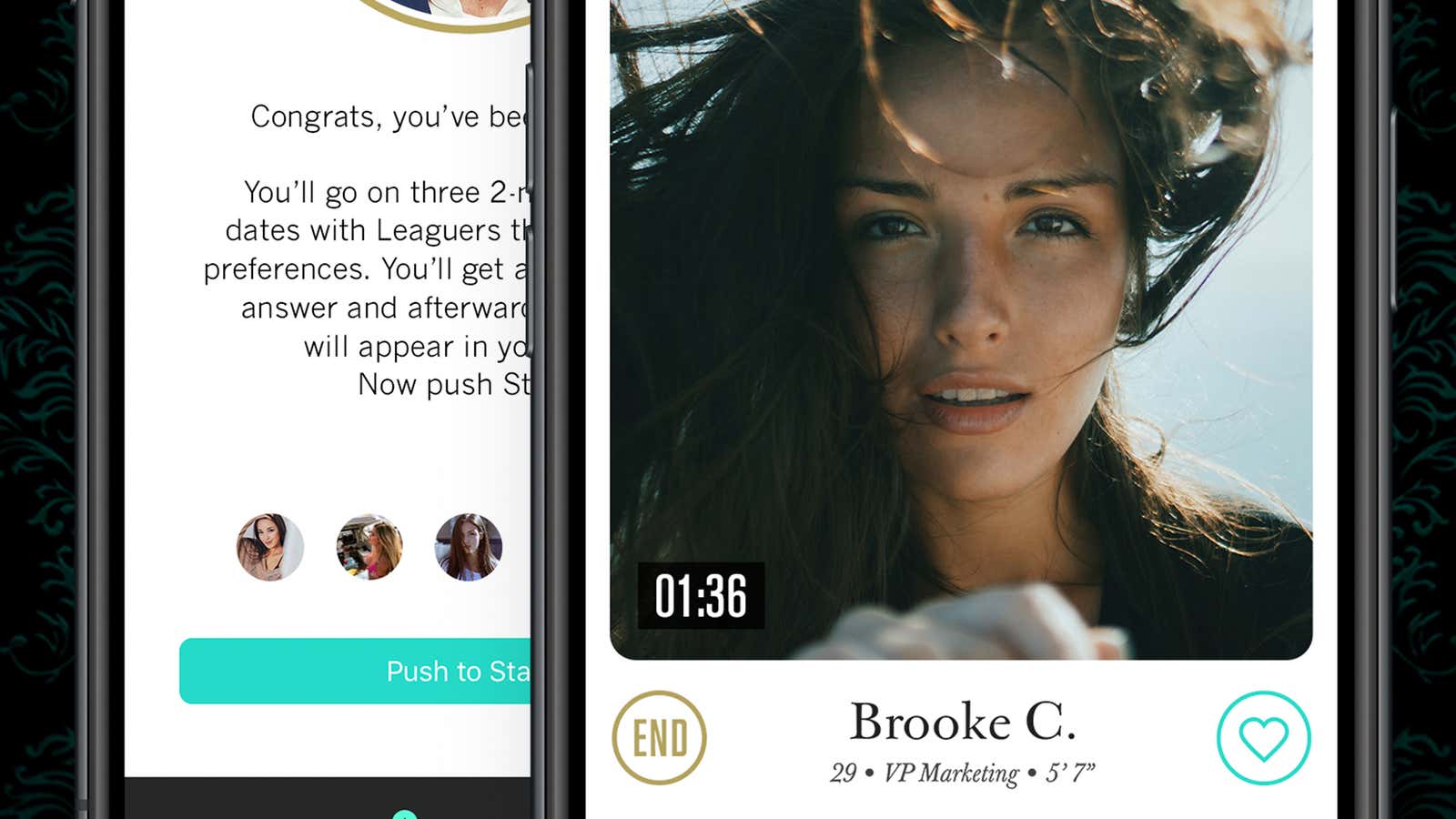Since the launch of Tinder in 2012, a range of apps have promised to make online dating even easier, less time-consuming, or a more pleasant experience. Bumble requires women to send the first message and allows men just 24 hours to respond, weeding out men who might project their insecurities on women. Hinge, the app that was designed to be deleted, limits how many people you can choose per day and requires users to answer three ice breakers on their profile upon setting up.
Raya charges approved members $7.99 a month to date and network with people mostly working in the entertainment industry, including artists, musicians, and models, in an exclusive and private setting (screenshotting on the app is forbidden and can lead to removal of your account). Another exclusive app, The League, puts an emphasis on its members’ professionalism, hence its requirement of a LinkedIn account for membership approval.
Although all of these popular dating apps have features that set them apart, each relies on conversations over text for would-be couples to arrange their first meetings. The League plans to change that. This month, it launched League Live, allowing members to speed-date through live video before matching.
Members of the app can choose three back-to-back live video dates, at two minutes each, every Sunday at 9pm local time. The feature solves many of the problems associated with online dating, like misrepresentative photos, catfishing, and delayed responses.
Amanda Bradford, founder and CEO of The League, says that the idea of a “first date,” as we know it, is seeing its final days. “In-person first dates will definitely be replaced by digital dates, as the stakes are lower and with video chatting you can figure out whether or not you click within the first few minutes,” she says. “It saves you time and energy to focus on dates that you are excited about.” According to The League’s website, versus the rest of the app’s users, people who match on League Live are three and a half times more likely to exchange phone numbers and meet offline.
Bradford predicts the genre will get more sophisticated with the arrival of virtual- and augmented-reality features, such as the use of 3D avatars that resemble and sound exactly like users in real life. And she envisions integrations with local bars and restaurants to form curated pools of potential daters both digitally and physically in a matter of minutes. “What we would like to build is the ability to organize meet-ups more automatically based on where people already are, versus trying to organize something in advance,” Bradford says. “This will ensure serendipity can still be achieved in the mobile dating app era and that ‘meet-cutes’ don’t die, they simply grow in number as they become better enabled with smart technology.”
Video as an initial interaction hasn’t always gone smoothly. Chatroulette, a website that pairs random users to chat via webcam, was popular for unsolicited exposure of male genitalia after it launched in 2009. But the chances of receiving unsolicited images might decrease as an app’s selectiveness increases. This is where The League’s history of controversy, as an app labeled as “elitist,” might actually have some benefits.
Not just anyone can get on the app, and there’s allegedly a waitlist of hundreds of people hoping to get approved, creating a more monitored and limited dating pool that might weed out people looking to use the video feature for the wrong reasons.
Bradford, who feels the feature emulates meeting randomly in real life, notes that a protected environment with verified users makes the exchanges authentic and safe, and says The League takes additional steps to vet who is allowed to use the video feature. “We only select users who have been on the platform long enough to have a valid ‘League Score’ data—this score reflects their behavior on the app and when talking to matches,” Bradford says. “Anyone who has been flagged or blocked by a match is not selected for entrance.”
Additionally, users have the ability to flag a user while in the chat, in which case the call is instantly ended and the offending user is banned from future League Live sessions. Depending on the reason for the flag, the user could be removed from the community, permanently.
The League provides users the option to record the video chats if both users opt-in for this safety feature. According to Bradford, no one has requested the recording feature yet, nor has any bad behavior been reported, but if it happened, the app would likely make monitoring required rather than optional, she said.
